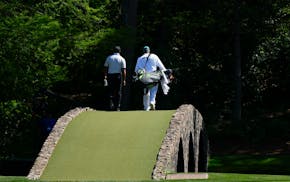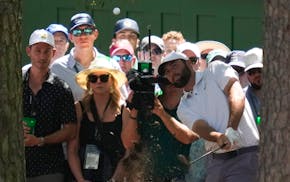Last April, the Timberwolves completed their 11th consecutive losing season, their fifth straight with Ricky Rubio as their point guard.
Last May, Rubio's mother died of lung cancer.
Last June, Tom Thibodeau became coach of the Timberwolves, then drafted Kris Dunn, a point guard who appeared to fit his eye and philosophy better than did Rubio.
Last August, Rubio performed as he often does with his national team during the Olympics, producing mediocre statistics.
From the beginning of Wolves training camp through midwinter, Rubio performed and shot poorly as the Wolves once again buried themselves in the standings.
In February, Thibodeau reportedly tried to trade Rubio, perhaps for the problematic Derrick Rose. Rubio muttered unhappily about this development; Thibodeau responded, "Everyone needs to do their job."
Even factoring in the princess-and-the-pea existence of moneyed NBA veterans, Rubio has had a rough year. There is no doubt that the Timberwolves drafted Dunn so they could eventually replace Rubio, preferably trading him for value. The most likely outcome of this plan would be Rubio leaving Minnesota without having contributed to a single winning season and watching from afar as the Timberwolves built a contender.
In the past month or so, three developments have altered Rubio's present and probably his future. Zach LaVine was lost for the season. The Wolves have performed better without LaVine. Playing in an offense with more shots available and clearer priorities for a passer, Rubio has played like a star.
Rubio's fans have always lauded the subtleties in his game, but his poor outside shooting and struggles to finish at the rim had too often gummed up the Wolves' offense. Lately, there is no need to cite subtleties when praising Rubio.
He has improved his shooting and elevated even the enduring strengths of his game, his passing and decisionmaking.
It's almost as if the combination of surviving the trade deadline while grasping how willing Thibodeau was to deal him galvanized Rubio. In a sports world filled with unintended consequences and benefits, the best sports psychology for Rubio turned out to be a friendly fire insult.
Rubio easily outperforming Dunn might speed the Wolves' improvement. Instead of integrating a young point guard into an already-young team, the Wolves may now move forward with a roster begging remarkably few upgrades to contend next season.
If Rubio is your team-leading point guard, Dunn profiles well as a defensive-minded backup. Tyus Jones has displayed the ability to play both guard positions. When LaVine returns, the Wolves could be set at guard for years.
Karl-Anthony Towns is already an historic producer. Andrew Wiggins could become one of the league's best players.
LaVine could become a valuable player on a winning team, or he could be used to bring in a veteran.
Nemanja Bjelica … Shabazz Muhammad … Gorgui Dieng … The Timberwolves are building depth as well as star power as they belatedly adapt to Thibodeau's defense and demanding nature.
With Rubio playing the best basketball of his life, the Wolves have won eight of 12. They are hanging around the playoff race, meaning they will at least play pressured games in late March, such as tonight's matchup in Boston.
The problem with franchises that beg for patience is that they sound just like all of the perpetually losing franchises that also beg for patience. Strangely for the Wolves, patience proved most necessary for their most established player.
The Wolves are now justifying projections of future greatness, and for perhaps the first time since Thibodeau arrived, you can envision Rubio as an active member of a winning Timberwolves team rather than as ballast.
Rubio has endured a long, difficult year, one that has tested him as a player and as a professional. Give him full credit for emerging as a better player and giving himself a chance to be an important part of a rising team.
Jim Souhan's podcast can be heard at MalePatternPodcasts.com. On Twitter: @SouhanStrib. • jsouhan@startribune.com

Souhan: Why Tiger Woods should keep swinging
Souhan: Scheffler wins Masters again, shows what makes him special
Morikawa falters in final round at Masters

Keeping up with the Joneses who helped design Augusta National's classic back nine


![Karl-Anthony Towns (32) was guarded by Ian Mahinmi (28) in the second quarter. ] CARLOS GONZALEZ ï cgonzalez@startribune.com - March 13, 2017, Mi](https://arc.stimg.co/startribunemedia/45EH76TZ5MMQXGOLXNV7254W4A.jpg?w=600&h=600&auto=format%2Ccompress&cs=tinysrgb)